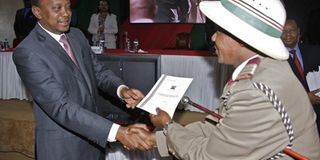President Kenyatta hands more powers to county bosses

President Uhuru Kenyatta presents a booklet outlining the new roles of County Commissioners to Mombasa County Commissioner Nelson Marwa during its official launch at the Kenya School of Government in Nairobi on May 15, 2014. PHOTO | PSCU
What you need to know:
- The governors and the opposition said the new structure of government would undermine devolutio
- Isaac Ruto said the President’s recreation of a powerful provincial administration was part of the wider scheme by the government to destabilise devolution
President Uhuru Kenyatta on Thursday officially delegated executive power to county commissioners, a move that sparked immediate uproar from governors and opposition leaders.
The President further gave Cabinet Secretaries full authority to be in charge of their respective dockets.
“We should not hear any more complains from Cabinet Secretaries that they are being frustrated by senior officers who say their position will remain after the secretaries leave; this must end and Cabinet Secretaries should now manage their staff,” he said.
The governors and the opposition said the new structure of government would undermine devolution.
Under the new order, county commissioners will be the official representatives of the National Government in their respective counties and will have wide-ranging powers: from chairing security meetings to coordinating responses to disasters and enforcing discipline in the civil service.
Mr Kenyatta, while launching the new structure, gave an executive order delegating 10 functions to the commissioners.
“We are now giving responsibilities directly to those who are with the people so that the question of ‘we are waiting for orders from above’ no longer exists,” he said. “There are no orders from above except the efficient delivery of service... We are now giving you responsibilities to perform those functions.”
He based his decision on Article 132 (3b) of the Constitution and Section 7 of the National Government Coordination Act, 2013 which provide guidelines on how the President may coordinate and delegate functions.
Mr Isaac Ruto, the chairman of the Council of Governors, said the President’s recreation of a powerful provincial administration was part of the wider scheme by the government to destabilise devolution.
IMPEACHMENT
He also said the ongoing “impeachment wave” was part of a scheme to ensure that county governments failed.
ODM said the President’s actions amounted to presidential authoritarianism.
The President had said that the commissioners would be solely held accountable if the government mandate was not well-implemented or executed.
He told the commissioners not to wait for “orders from above” and instead swing into action and perform their duties.
“If I do not sleep, you will not sleep too, you will remain awake until we have no insecurity and citizens have received their rightful services,” he said.
However, he did not define how the commissioners would relate with governors. In fact, neither the word ‘governor’ nor ‘devolution’ was mentioned during the entire event in which the President launched two important policy documents on managing civil servants and defining the role of the National Government in counties.
Public Service chairperson Margaret Kobia said the two documents — the Policy Frameworks on Decentralisation of Human Resource in the Public Service and Strengthening of the National Government Co-ordination Function — would go a long way in ensuring that the civil service efficiently and effectively delivered its mandate.
Under the new changes, senior officers, those in Job Group S and above, will be required to work on fixed contracts.
“The fish rots from above, therefore, to ensure efficiency, those in higher job groups will be required to work on fixed contracts,” Prof Kobia said.
Mr Kenyatta warned of severe sanctions against officers who failed to abide by his executive order of being fair and responsible in discharging their duties.
He said Cabinet Secretaries now had the power to discipline officers under them.
“The Public Service Commission has now given you the authority to manage the staff under you. So if programmes in your ministries are not implemented, you will be held accountable,” he said.





